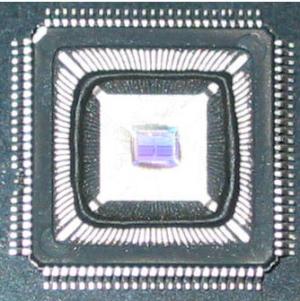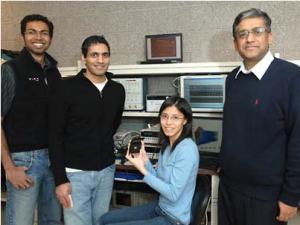The Chip Mounted in Plastic (Source: MIT)

MIT Researchers with Low Voltage Chip (Source: MIT)
New chip design uses only 0.3V of power
Back in February a group of researchers from MIT and Texas Instruments designed a new chip for portable devices that uses a mere fraction of the power required in similar chips today. The researchers were able to design a chip that may be up to ten times as energy efficient as current technology.

Current chips operate at about 1 volt and the new design from the MIT researchers operates on 0.3 volts of power. Anantha Chadrakasan, Professor of Electrical Engineering told MIT Energy Initiative, “Memory and logic circuits have to be redesigned to operate at very low power supply voltages. Chadrakasan directs the MIT Microsystems Technology Laboratories, where the work was conducted.
Simply reducing the voltage required for the chip to operate wasn’t the only trick the researchers used to get energy savings for the chip. The researchers also optimized the energy processing circuitry to account for several factors including environmental conditions and variations in circuit demands.
One key to the efficient nature of the new chip design according to Chadrakasan says was a high-efficiency DC-to-DC converter used to reduce voltage to lower levels built right onto the chip. At this point the chip design is only a proof of concept and significant obstacles remain to be overcome before the chip can enter production and ultimately end up in your cell phone. Researchers say that one of the biggest problems they had to overcome was the variability in chip manufacturing.
Lower voltage levels mean that differences in variations and imperfections in the chip building process are magnified and become a problem. Chadrakasan says that commercial applications for the new chip could be seen in five years or sooner. The researchers are also looking at applications for the low voltage chip other than in electronics.
Since the chip can operate on such low power requirements, the researchers also believe it could be used in implantable devices like pacemakers. In this application the chip would be able to get all the power it needs from body heat or the movement of the person with the implant. This would allow implantable devices to be powered indefinitely. Battery life is currently a very big concern for implantable medical devices.
One of the main reasons cited for the lack of encryption on telemetry data sent from pacemakers and internal defibrillators is the added strain encryption would put on the battery inside the devices. A low power chip that gets all the power it needs from the body may be just what is needed to allow stronger security in implanted medical devices.
These researchers aren’t alone in their quest for lower voltage, less power hungry chips and processors. Intel recently introduced its Atom processor which is a full x86 processor and requires only 0.6W of power. The Atom processor still consumes more power than the 0.3V design from MIT.
